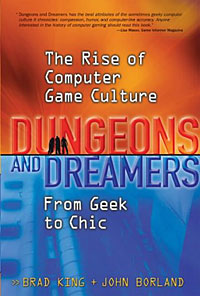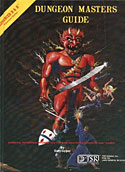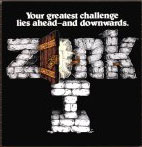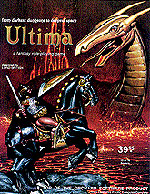



 Dungeons
and Dreamers
Dungeons
and Dreamers
The Rise of Computer Game Culture
Review by James McGovern
February, 2005
I have a confession. I used to play Dungeons and Dragons. Yes, that’s right…I know you didn’t see it coming. I mean, surely a guy in his mid-thirties who writes retro-gaming reviews could not have been a geek as a young teen right? I am sorry to have shattered your world folks, it’s true; I am that geek.
As a kid, I really dug D&D as well as other RPGs like Steve Jackson’s Car Wars. At any given time during the week, I could be found drawing up diabolical dungeon maps on octagonal graph paper in preparation for the next weekend’s adventure with fellow gamer Jerry Paddock, or testing my Revell-Monogram acquired painting skills on tiny fantasy figurines.

Yeah, that's me (upper right hand corner)
When a childhood friends and fellow D&D aficionado, Tom Zahoric, picked up a Commodore 64 and gave me the grand tour, I was hooked. One night we played Zork until dawn trying to sort out the elusive wordplay needed to advance in the quest. Suddenly all of my RPG efforts started to shift towards electronic pursuits. I began plotting to write a program that would allow me to play Car Wars on the C64. I made good progress and actually had a BASIC program that would allow one to generate a car’s specification sheet on the computer. By then games were coming out once a week for the C64 and I became a consumer rather than a publisher.
My decidedly geeky history in mind, imagine my pleasure when I received and read Dungeons & Dreamers: The Rise of Computer Gaming Culture from Geek to Chic from McGraw-Hill/Osborne press. (I’m Chic now? Somebody PLEASE tell my wife!)
 Dungeons and Dreamers is the work of two well-established
writers, Brad King and John Borland. Brad and John have impressive resumes
in journalism and their talents shine in this work. The book is well
written and the stories relayed within provide a compelling read. I tend
to be a sucker for video game related media and would enjoy reading a
matchbook that had a blurb about gaming. There are times though when
it is tiring to read some video game books as often the writers do not
have a formal education or talent for the craft. Dungeons and Dreamers
certainly does not fit that description as the writer’s talents
have produced an entertaining and enjoyable volume.
Dungeons and Dreamers is the work of two well-established
writers, Brad King and John Borland. Brad and John have impressive resumes
in journalism and their talents shine in this work. The book is well
written and the stories relayed within provide a compelling read. I tend
to be a sucker for video game related media and would enjoy reading a
matchbook that had a blurb about gaming. There are times though when
it is tiring to read some video game books as often the writers do not
have a formal education or talent for the craft. Dungeons and Dreamers
certainly does not fit that description as the writer’s talents
have produced an entertaining and enjoyable volume.
The authors are not here to tell the tale of pale-skinned loners locked in the furthest reaches of their Mother’s basement churning out computer code with fantasy flare. This is the story of community gaming. From the early BBS systems to the internet as we know it today, many saw that the teamwork and interaction of the role-playing games would be recreated and enhanced by porting the quests to the digital world.
 Dungeons & Dreamers: is the story
of the gaming seeds strewn by RPG gamers leading up to Gary Gygax’s phenomenal successes with
the D&D franchise. From there we are shown how the turn-based and dice-driven
games were the perfect proving ground for the looming home computing and
electronic gaming revolution already in its ascendancy. For anyone with
programming experience, it was easy to see that the structure, rules, and
stories of the D&D world were perfect predecessors for the related
game programs yet to be written. D&D and its cousins were the pseudo-code
for the inevitable flood of electronic dungeon quests.
Dungeons & Dreamers: is the story
of the gaming seeds strewn by RPG gamers leading up to Gary Gygax’s phenomenal successes with
the D&D franchise. From there we are shown how the turn-based and dice-driven
games were the perfect proving ground for the looming home computing and
electronic gaming revolution already in its ascendancy. For anyone with
programming experience, it was easy to see that the structure, rules, and
stories of the D&D world were perfect predecessors for the related
game programs yet to be written. D&D and its cousins were the pseudo-code
for the inevitable flood of electronic dungeon quests.
By the time I was making my transition from dice and graph paper to BASIC programming and the electronic gaming, others had begun drawing on their experiences with games like D&D, and were producing electronic games based on those experiences. Work that began on borrowed or stolen time on university mainframes was being continued on the first generation of home computers. The old BBS's (Bulletin Board Systems, the old-timer’s internet) were allowing gamers and coders to exchange ideas, modify each other’s code, and signal the beginning of the online gaming phenomena.
Author’s King and Boreland begin the tale in the serene town of Lake Geneva, Wisconsin at the home of longtime war gamer, Gary Gygax. Gary and his merry band of travelers are piecing together the last components of what would go on to become the global phenomena that is Dungeons and Dragons. Sitting around a gaming sand table in Gygax’s lair, neither he nor his cohorts realized what treasure they had just unearthed.
It was from these early RPG sessions and the first inklings of the Tolkien inspired worlds they were creating, that pimple-faced coders would become inspired to continue the quest albeit using spells concocted of binary code in labyrinths existing only of electromagnetic pulses.
 Some great memories were unearthed in this portion of the book as I was
reminded of Zork, first computer fantasy game I ever owned. As mentioned
earlier, I was no stranger to Zork and its sequels. I was entranced and
often quite frustrated by the text-based adventures. Entranced by the imaginative
energy it helped to elicit, yet frustrated by the uncaring coldness of
the text on the screen. It did not help that this was one sarcastic set
of adventures. Look at the Zork code snippet below from; http://www.csd.uwo.ca/Infocom/Articles/ieee.html and
you can see that the software was written to produce exactly the response
I had then and now when playing the game.
Some great memories were unearthed in this portion of the book as I was
reminded of Zork, first computer fantasy game I ever owned. As mentioned
earlier, I was no stranger to Zork and its sequels. I was entranced and
often quite frustrated by the text-based adventures. Entranced by the imaginative
energy it helped to elicit, yet frustrated by the uncaring coldness of
the text on the screen. It did not help that this was one sarcastic set
of adventures. Look at the Zork code snippet below from; http://www.csd.uwo.ca/Infocom/Articles/ieee.html and
you can see that the software was written to produce exactly the response
I had then and now when playing the game.
<DEFINE READER ( ) <TELL "How does one look through a " 1 <ODESC2 <PRSI>> "?"> ;"It failed the test, so print sarcasm")
 King and Boreland quickly transition to a young Richard
Garriot of Ultima fame and his first experiences with the worlds Gygax had
engineered. Garriot goes on to host huge D&D parties and begins to make his own shift from
the gaming table the computer keyboard. It is here he finds his muse and goes
onto create the Ultima series culminating in Ultima Online that brought the
spirit of community, teamwork, and competition to a digital fantasy world for
gamers worldwide. This would be one if the first fully graphic “Massive
Multiplayer Online Role Playing Games” or (MMORPGs) to reach a largely
mainstream audience.
King and Boreland quickly transition to a young Richard
Garriot of Ultima fame and his first experiences with the worlds Gygax had
engineered. Garriot goes on to host huge D&D parties and begins to make his own shift from
the gaming table the computer keyboard. It is here he finds his muse and goes
onto create the Ultima series culminating in Ultima Online that brought the
spirit of community, teamwork, and competition to a digital fantasy world for
gamers worldwide. This would be one if the first fully graphic “Massive
Multiplayer Online Role Playing Games” or (MMORPGs) to reach a largely
mainstream audience.
From these fantasy-inspired roots, the reader is shown how the developers inspired new artists and programmers such as John Carmack of Doom and Quake fame. While the spirit of teamwork and chivalry may have inspired young coders like Garriot, Carmack and his partner John Romero of Id Software found an audience in kill or be killed frag at will shooters. Though Doom and other Id offerings appeared to be a departure from Gygax’s quests, in many ways the same elements of a connected society took root.
King and Boreland explore the ways in which the gamers found connections among each other through the crosshairs of Id’s arsenal as well as the avatars of online fantasy worlds such as Ultima Online. A vast network of chat room pen pals developed from these games, resulting in conventions, gatherings, and in many cases lasting friendships.
The online worlds depicted in the book are seen as common areas in which people would assemble to play the game and through that interaction form new ties in and outside of the virtual settings. It is here the programmer’s begin to realize they have lost control. By creating worlds not of strict cause and effect rule sets but of overall parameters by which the gamers must adhere like the physics that dictate what we can and cannot do in real life, they allowed a form of free choice.
 One of my favorite anecdotes in the book is relayed
by Garriot regarding his new Ultima Online world. He speaks of a young lady
trying her best to navigate the virtual setting. She complains to the administrator
(then Garriot) that a “blur” has zipped past her and stolen all
of her items. Garriot comes to the rescue and freezes the thief, who has
apparently scripted the keystrokes needed to steal her belongings. The thief
is stripped of his booty and soundly reprimanded amid his vociferous promises
never to harass the maiden again.
One of my favorite anecdotes in the book is relayed
by Garriot regarding his new Ultima Online world. He speaks of a young lady
trying her best to navigate the virtual setting. She complains to the administrator
(then Garriot) that a “blur” has zipped past her and stolen all
of her items. Garriot comes to the rescue and freezes the thief, who has
apparently scripted the keystrokes needed to steal her belongings. The thief
is stripped of his booty and soundly reprimanded amid his vociferous promises
never to harass the maiden again.
Upon returning the items, Garriot witnesses the blur of the thief again stripping the adventurer of her meager treasure. The reprimands are repeated with threats of banishment from the game and the items are retrieved. Again the items are returned only to be rapidly snatched by the dexterous bandit. Garriot has had enough and confronts the outlaw exclaiming that he was warned and now he must be banished from the game. The thief replies to the effect, ‘Hey, YOU created this role playing game. I am role-playing as a thief. You caught me and I did what I had to do in order to get away. I lied and said I would never do it again. That is what my character would do!’
Garriot was forced to let the vagabond go free and inform the maiden she was on her own. The player rightfully told Garriot that he was playing the game within the physical parameters set forth, Garriot had no right to impose other rules based on his own moral code. That was the specific moment Garriot says he realized he had lost control.
The last passages illustrate the beauty of the story told by King and Borland. This is a story about people from disparate backgrounds and geographic locations coming together through ideas, such as the early game developers, or by common entertainment interests such as the dice and paper gamers and their later, online counterparts. The resulting connections formed are only enhanced by the “hands-off” approach to building these worlds. Through a general framework of the virtual spaces, people are free to interact and explore in ways the programmers may never have realized. The only limit to the power of the game, as Gary Gygax exclaimed on all D&D packaging, is the player’s imagination.
Both genres of games were and are often depicted as realms of the reclusive and socially maladjusted loner. King and Borland show us that this is not the case. These games are more often than not, community endeavors. They are activities that bring people together, not push them apart. It is in a similar vein that I complete this review of the excellent manuscript produced by King and Borland.
This book has brought back a flood of fond memories filled with late night gaming sessions, nerdy conversations, and truly fulfilling competitions. You may remember I named two of my childhood friends and fellow gamers early on in the review. I am now rolling the dice in the hopes that through a renewed interest in gaming or by way of a lucky Google search, Tom Zahoric and Jerry Paddock might find this hidden clue in the vast virtual world of the internet. I would very much like to draw swords with them and spelunk once again through the deep caverns of our collective imaginations.
Dungeons and Dreamers Home Page
Questions? Comments? Feel freel to email James at james![]() retroblast.com
retroblast.com
